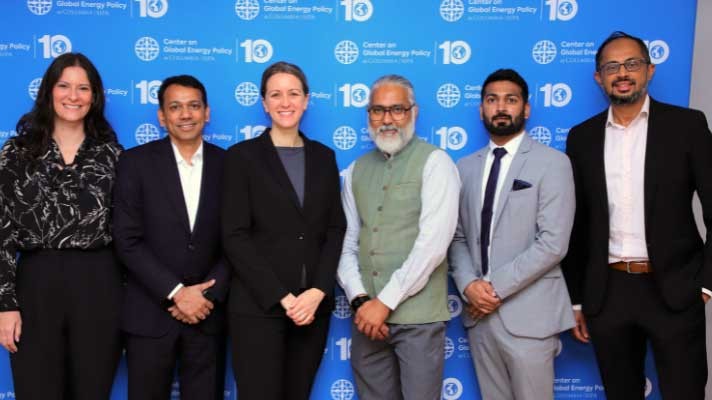The Columbia India Energy Dialogue

With India’s energy consumption projected to grow about 1.5 times faster than the global average by 2050, the country has made significant policy choices in its transition towards a sustainable energy system. To discuss the policy ecosystem required for India’s energy transition, Columbia Global Centers | Mumbai partnered with Columbia University’s Center on Global Energy Policy (CGEP) at the School of International and Public Affairs, for the Columbia India Energy Dialogue that was held at the Mumbai Center on May 18, 2023. The program witnessed participation of over 40 eminent experts from esteemed private, professional and research organizations.
The introductory session outlined the implications of India’s bold policy choices for achieving a net-zero target. Through a comprehensive overview of India’s commitments, speakers highlighted key policy announcements for providing universal energy access, increasing the share of natural gas in the energy mix, and decarbonizing the transport sector in order to achieve energy independence by 2047. Summarizing the nation’s roadmap for a clean and sustainable ecosystem, panelists pointed to the importance of strengthening collaboration between public and private sector entities, coordinated action between the Center and the states, as well as evidence-based and policy-relevant research for the energy transition to progress without major disruptions.
The contradiction between India’s ambitious energy transition targets and its current economic growth trajectory was addressed in the following session entitled Financing the Green Energy Agenda. The panelists discussed India’s need to strike a balance between growth and transition by investing in green energy, specifically in ‘green bonds,’ by building robust frameworks that popularize investments in green bonds and allow for an eventual increase in their share in the global market. One presentation explored the role of technology and frontier solutions for spurring green growth. The audience was briefed about opportunities and resources that India can leverage and the possibilities that offshore wind energy can offer.
The final session of the event focused on nuclear energy, more specifically on the policy regulations, framework and scope of scaling up India’s nuclear power plants and their potential in driving India’s energy transition and low-carbon ecosystem.
Through targeted discussions that facilitated an exchange of ideas and knowledge, the Columbia India Energy Dialogue highlighted the crucial role that India will play in global energy transition. The dialogue raised relevant questions including essential mandates for new policy developments, upcoming financial opportunities for investors, sustainability of renewable energy sources, and issues of a just transition to net-zero.